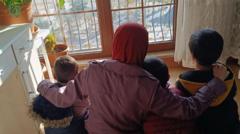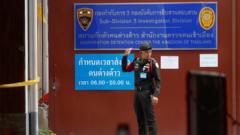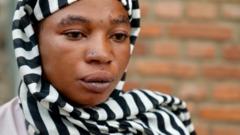**Human rights groups warn that the Thai government's actions could result in tragic consequences for families already torn apart.**
### Looming Deportation for Uyghurs Sparks Fear Among Families

### Looming Deportation for Uyghurs Sparks Fear Among Families
**In Thailand, Uyghur detainees face uncertainty as deportation threatens their families' futures.**
Niluper, a Uyghur mother of three, has been living in emotional turmoil for almost a decade since her family fled repression in Xinjiang, China. Residing in Turkey after her release from a Thai detention center in 2015, she anxiously awaits news of her husband, who remains imprisoned in Thailand alongside 47 other Uyghurs. A recent attempt by Thai officials to coerce detainees into agreeing to deportation back to China has heightened her fears of losing him forever.
"I don't know how to explain this to my sons," Niluper confided during a video call. While she and her children are safe in Turkey, the possibility of her husband’s imminent deportation looms large and unwelcome, leaving her in a state of persistent worry and heartbreak.
Human rights advocates are drawing attention to the dire situation within Thailand’s Immigration Detention Centre (IDC), where 43 Uyghur men are held under deplorable conditions. Once again, discussions of their pending deportation have revived traumatic memories among those once detained. The Thai government insists there are no immediate plans for deportation, yet human rights groups argue that the Uyghurs could be sent back at any moment.
These men, some of whom have been imprisoned since 2014, endure overcrowded, unsanitary, and unsafe conditions at the IDC, known for its lack of basic necessities. When Thailand last deported Uyghurs in 2015, they were shown hooded and handcuffed, prompting global condemnation and demands for accountability.
Amidst fears fueled by previous deportations, those confined at the detention center face an uncertain future, exacerbated by the ongoing pressure from the Chinese government on Thailand to repatriate Uyghurs. As international apprehension grows, donors and organizations have failed to provide the support needed for these vulnerable individuals.
For Niluper’s husband and the others in detention, each passing day intensifies their sense of isolation and fear. Reports suggest health-related issues due to poor living conditions are rampant, and without adequate food or medical treatment, many detainees’ lives hang in the balance. Such anxiety extends not only to the detainees but to their families, who mourn the loss of connection and fear for their loved ones' safety.
In a poignant reflection, Niluper recalls the trauma her eldest son experienced during their separation. For the Uyghur community, the battle for survival continues as resettlement remains elusive, and the haunting possibility of deportation looms grimly over their futures.




















